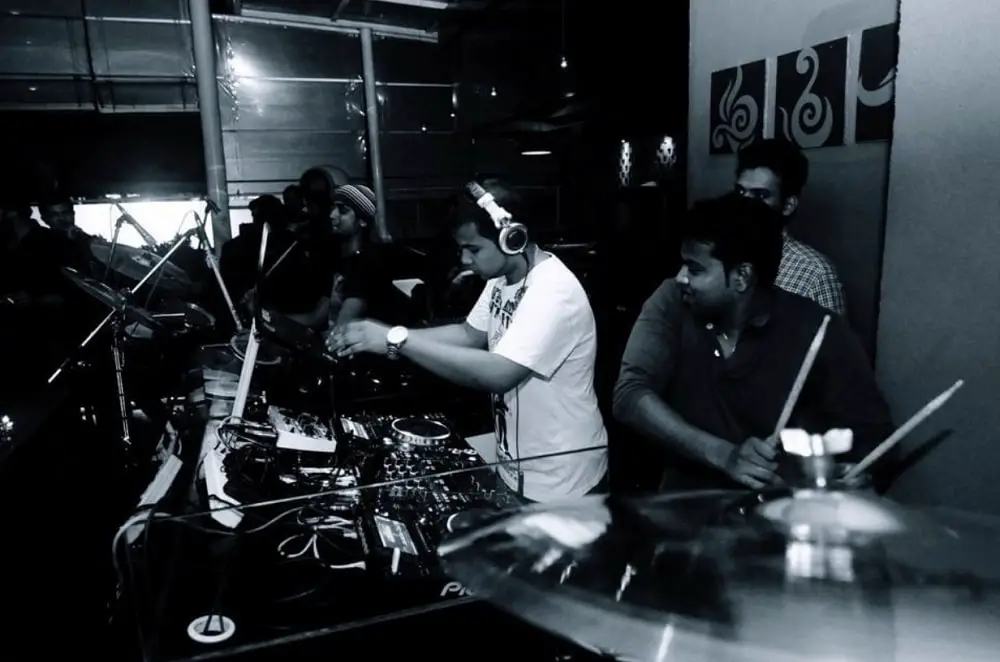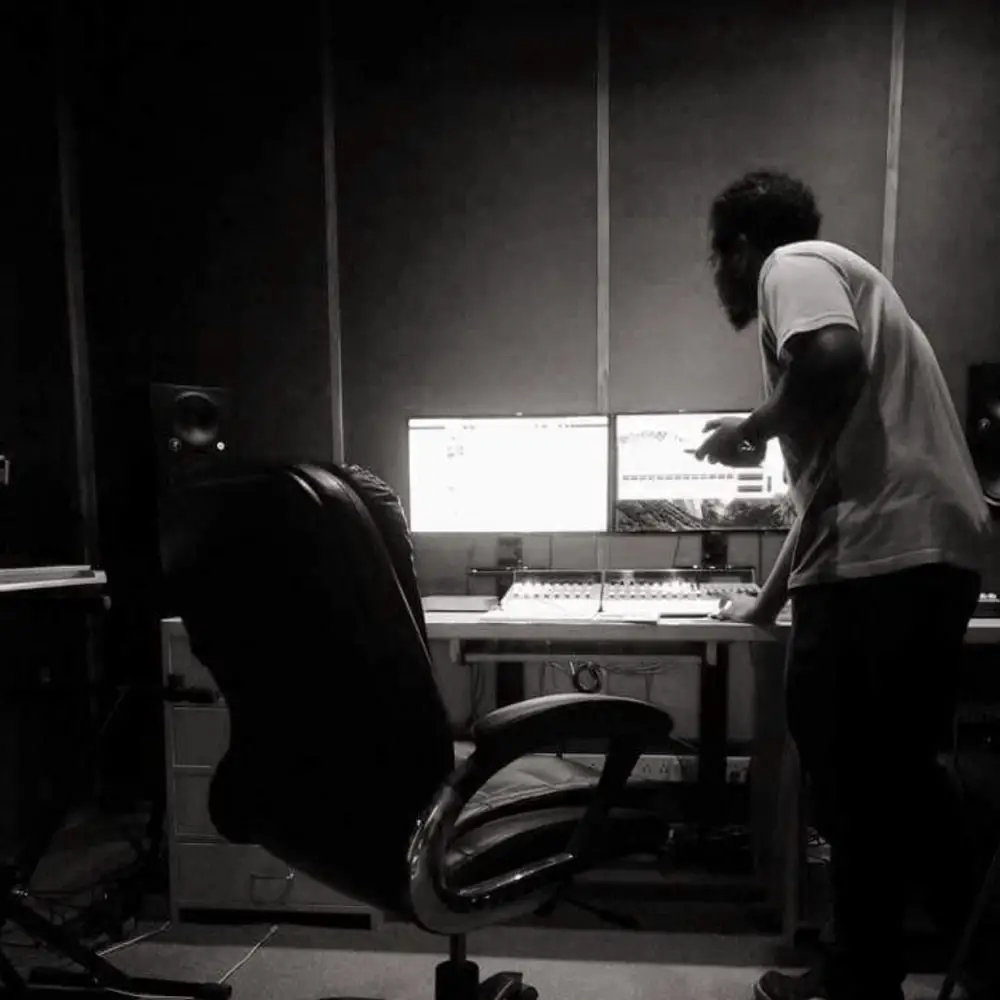Salary, Job Description, How To Become One, and Quiz
.jpg)
Sound Engineering Technicians
Sound Engineering Technicians assemble and operate equipment to record, synchronize, mix, edit, or reproduce sound, including music, voices, or sound effects, for theater, video, film, television, podcasts, sporting events, and other productions.
Table of contents
What they do
Sound Engineering Technicians assemble and operate equipment to record, synchronize, mix, edit, or reproduce sound, including music, voices, or sound effects, for theater, video, film, television, podcasts, sporting events, and other productions.
- Confer with producers, performers, and others to determine and achieve the desired sound for a production, such as a musical recording or a film.
- Prepare for recording sessions by performing such activities as selecting and setting up microphones.
- Record speech, music, and other sounds on recording media, using recording equipment.
- Regulate volume level and sound quality during recording sessions, using control consoles.
Typical day
On a daily basis, Sound Engineering Technicians tear down equipment after event completion. They regulate volume level and sound quality during recording sessions, using control consoles.
A typical day for a Sound Engineering Technician will also include:
- Prepare for recording sessions by performing such activities as selecting and setting up microphones.
- Report equipment problems and ensure that required repairs are made.
- Separate instruments, vocals, and other sounds, and combine sounds during the mixing or postproduction stage.
- Set up, test, and adjust recording equipment for recording sessions and live performances.
- Record speech, music, and other sounds on recording media, using recording equipment.
Other responsibilities
Besides their typical day, Sound Engineering Technicians also convert video and audio recordings into digital formats for editing or archiving. They may also create musical instrument digital interface programs for music projects, commercials, or film postproduction.
On a weekly to monthly basis, Sound Engineering Technicians report equipment problems and ensure that required repairs are made. They might also reproduce and duplicate sound recordings from original recording media, using sound editing and duplication equipment.
In addition, they keep logs of recordings.
Although specific duties may vary, many of them set up, test, and adjust recording equipment for recording sessions and live performances.
To some Sound Engineering Technicians, it is also their responsibility to separate instruments, vocals, and other sounds, and combine sounds during the mixing or postproduction stage.
What is the job like
Job satisfaction
Is this job meaningful
76% said they were satisfied with their job and 42% said they found their job meaningful.

I’ve worked as a sound engineer for several studios in Bangalore for over 5 years now. And also picked up live sound engineering gigs in Delhi and Bangalore over the year. Currently, I take up freelancing gigs and work on my own music.

Live mixing for a band at the studio
My typical day
As a studio sound engineer, my day was packed with recording radio ads, jingles, voice over and background scores for TV ads, social media ads as well as background scores for TV shows and movies.
Deadlines can be pretty tight, so you always gotta be quick, clean, and efficient. If you’re not committed and do a shoddy job, your client won’t think twice before moving on – after all, sound is one of the most important elements of any video. Sometimes deadlines are just a day, as audio for video and ad work are the last stage of any production house. So keep yourself ready for anything.
Once I finish all my work, I’d review everything that’s done for the day in ascending order. This helps me get another perspective as my ears would have been exhausted from listening to different projects.
Pros
There’s never a dull day as the work you get from your clients is always different and it’s gonna stay that way.
Some days I had to simply record a podcast for an NGO and some days it’s adding foley sound effects for TV ads, shows, or movies. In fact, I worked on adding background scores for a popular Indian TV show too! But most of all my favorite kind of gig was always recording the radio ads. I also worked with a lot of budding music artists and bands who’d come over to the studio to record themselves for their debut YouTube video. My job during the recording process also involved guiding them to make sure they’re on time and pitch.
And post-recording, my job was to enhance their voices and the whole music recording. And watching their faces light up as their sounds all came together would just make my day!
This is what makes my day – you come into work with a blank sheet and end it with so much creativity.
You get better every day at what you do and start challenging yourself for more complex work with a better pay grade – which is rewarding in many ways.
When I started as a sound engineer at the studio, the only work I was given was basic recording and editing. Editing is fun but if you’re doing the same old-same old day in, day out – it gets monotonous. But as a studio sound engineer, you simply have to be an expert at sound editing.
Though I didn’t realize it at first but my initial days of just editing refined my skills. Once you’re skilled at editing you move on to mixing and mastering which helps you enhance the sounds to another level. It ensures that the sound is industry standard and ready for distribution on all channels.
Some days I’d even have live sound mixing gigs. This is where I have to mix in sounds from different instruments and the vocal artist live.
So you see it’s a whole range of work and it never gets monotonous cause you don’t know what challenge awaits you for the day!

Editing
Cons
Now I’m going to be real with you here. It’s not glamorous. You spend hours or nights behind the screen if you take up a studio sound engineer gig. As a live sound engineer, it’s all exciting in the beginning cause there’s a lot of traveling involved and you get to attend all sorts of shows. Now, these shows can start at 6:00 am in the morning and go on till 2 in the night. And as a sound engineer, you have to be present at all times. So yeah, I guess you could say there’s not much of a social life.
Pro tip: If you’re not passionate about sound then don’t do it.
Advice to the students on this career path
It’s not easy. No matter how passionate you’re about this – it’s not going to be easy. But it’s oh-so worth it! Sound engineering is going to be challenging but if this is your passion then don’t give up.
There are multiple paths you can take after your sound engineering – studio engineer, live sound engineer, and even a music producer.
I juggled a lot between being a studio engineer and DJ. And finally found my calling – music production. Though, I still work as a DJ in Bangalore and simultaneously, I take up clients now and then. So you see I’m still doing a bit of everything to keep things interesting for me.
What pulled me through most of my career as a studio engineer was the little victories I got with every client. It encouraged me to be better at my job. Every small or big gig made me who I am today.
And now though I don’t work at a studio anymore, I’ve managed to create a humble little studio in my home and take up clients as I please, along with making my music. And every single project I worked on, from my college till now, helped me get where I am today.
So I guess what I’m trying to say is every small (or big) project you take up as a sound engineer – treat it with equal respect and commitment because each of those will help you grow! You’ll never know which project is going to make or break your career.
Pros
Suitable for people who like practical and hands-on work.
Suitable for people who want independence and like to work on their own and make decisions.
This career is perfect for people who love to work indoors.
It is not too difficult to get into this career. Previous work-related skill, knowledge, or experience is required for this career.
Cons
Not suitable for people who like to help and teach others.
Long working hours (More than 40 hours per week).
How much do they make
Average salary
Average hourly wage
Entry-level Sound Engineering Technicians with little to no experience can expect to make anywhere between $27,650 to $35,460 per year or $13 to $17 per hour.
| Salary by experience | Annual | Hourly |
|---|---|---|
| Highest (Top 10%) | $119,720 | $58 |
| Senior (Top 25%) | $77,410 | $37 |
| Median | $53,520 | $26 |
| Junior (Bottom 25%) | $35,460 | $17 |
| No experience (Bottom 10%) | $27,650 | $13 |
This table shows the top 10 highest paying industries for Sound Engineering Technicians based on their average annual salary.
| Salary by industry | Annual | Hourly |
|---|---|---|
| Advertising, Public Relations, and Related Services | $92550 | $44.49 |
| Motion Picture and Video Industries | $87310 | $41.98 |
| Scientific Research and Development Services | $71740 | $34.49 |
| Employment Services | $69790 | $33.55 |
| Independent Artists, Writers, and Performers | $69310 | $33.32 |
| Sound Recording Industries | $67860 | $32.63 |
| Computer Systems Design and Related Services | $67220 | $32.32 |
| Merchant Wholesalers, Durable Goods | $64390 | $30.96 |
| Performing Arts Companies | $63980 | $30.76 |
| Promoters of Performing Arts, Sports, and Similar Events | $63110 | $30.34 |
View more salary by industries here.
Where can they work
Where can Sound Engineering Technicians work? Here is a table showing the top 10 largest employers of Sound Engineering Technicians including the average salary in that industry.
| Employers | Total Employed | Annual Salary | Hourly Wages |
|---|---|---|---|
| Sound Recording Industries | 2900 | $67860 | $32.63 |
| Motion Picture and Video Industries | 2520 | $87310 | $41.98 |
| Radio and Television Broadcasting | 700 | $56640 | $27.23 |
| Performing Arts Companies | 610 | $63980 | $30.76 |
| Colleges, Universities, and Professional Schools | 540 | $38570 | $18.54 |
| Promoters of Performing Arts, Sports, and Similar Events | 410 | $63110 | $30.34 |
| Rental and Leasing Services | 350 | $57830 | $27.80 |
| Independent Artists, Writers, and Performers | 250 | $69310 | $33.32 |
| Software Publishers | 250 | $ | $* |
| Other Information Services | 200 | $ | $* |
What is the work day like
Working hours
Working schedule
How often do you use email in this job?
Telephone
How often do you have telephone conversations in this job?
Group discussions
How often do you have group discussions in this job?
Public speaking
How often does this job require you to do public speaking?
Level of competition
How much competitive pressure is in this job?
What is the work environment like
Office-style environment
Indoors in an environmentally controlled condition
Warehouse-style environment
Indoors in a non-controlled environmental condition such as a warehouse
Outdoors
Outdoors exposed to all weather conditions
Outdoors – Under Cover
Outdoors but under cover (e.g. structure with roof but no walls)
How to become one
Difficulty to become one
Required level of education
What level of education do you need to perform the job?
Relevant majors
Music Technology
Audio Engineering Technology
Recording Arts Technology
Communications Technology
Relevant work experience
How much related work experience do you need to get hired for the job?
On The Job Training
How much on the job training do you need to perform the job?
Should you become one
Best personality type for this career
People with this personality type likes practical and hands-on work. They prefer working with plants, animals, and real-world materials like wood, tools, and machinery.
People with The Builder personality type likes practical and hands-on work. They prefer working with plants, animals, and real-world materials like wood, tools, and machinery.
People with The Thinker personality likes to work with ideas that require an extensive amount of thinking. They prefer work that requires them to solve problems mentally.
People with The Artist personality likes to work with designs and patterns. They prefer activities that require self-expression and prefer work that can be done without following a clear set of rules.
People with The Helper personality type likes to work with people and in teams. They prefer work that allows them to build relationships with others.
People with The Leader personality likes to start and work on projects. They also like leading people and making many decisions.
People with The Organizer personality type likes to follow set procedures and routines. They prefer working with data and details more than with ideas.
You can read more about these career personality types here.
People who are suitable for this job tend to like work activities that include practical, hands-on problems and solutions. They like working with plants, animals, and real-world materials like wood, tools, and machinery.
They also like working with forms, designs, and patterns. They often require self-expression and the work can be done without following a clear set of rules.
Take this quiz to see if this is the right career for you.
Work Values
Which values are the most important to a person’s satisfaction for this job?
You are someone who is results oriented. You prefer work that allows you to utilize your skills and abilities while at the same time giving you a sense of accomplishment.
You are someone who values job security, steady employment, and good working conditions. You also prefer work that keeps you busy all the time with something different to do every day.
You are someone who values job advancement and leadership roles. You prefer work that receives recognition for the work you do and jobs that are looked up to by others in the company and your community.
You are someone who likes to provide a service to others. You prefer a work environment where you can work with your co-workers in a friendly non-competitive environment.
You are someone who values a company that stands behind their employees. You prefer a work environment where everyone is treated fairly and is being supported by the company.
You are someone who likes to work on your own and make your own decisions. You prefer work that requires little supervision and are allowed to try out your own ideas.
Don’t know which career to pursue?
Take the career quiz to find careers that match your personality type.
Take The Career Quiz
.jpg)




.jpg)
.jpg)
.jpg)
.jpg)
.jpg)
.jpg)
.jpg)
.jpg)
